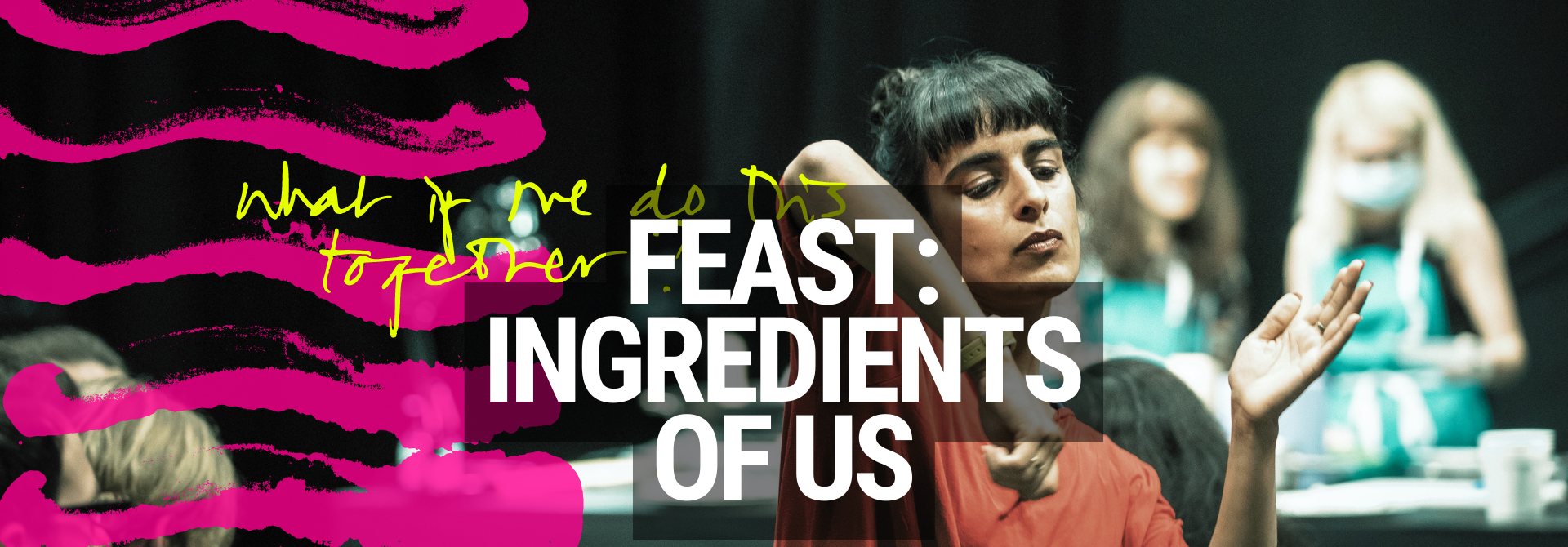A trilogy of work created by migrant theatre makers, exploring the boundaries of co-creation, participation and performance.
All three projects in the trilogy are conceived to be performed by a mix of professional and non-professional performers, and the input of local communities shapes the content and expression of each piece. The three pieces are all structured around a concept, and are re-developed in each location they perform, meaning the performances will never be the same twice.
FEAST: INGREDIENTS OF US
is an interactive, participatory event based around food, memories and connection – created by Polish director Agnieszka Blonska, together with video designer Gillian Tan and perfomer Tara Fatehi Irani.
‘FEAST’ looks into the tensions between culture and nature and asks big questions about our core values and our place within eco and political systems. Through cooking, eating and sharing recipes, the piece explores childhood memories, family relationships and present experiences.
In ‘FEAST’ the participants and audience are the true narrative of the performance, creating a communal sensory event which challenges any traditional sense of the spectator-actor relationship. By combining a multi-layered, locally anchored narrative based in lived experience with sensual experiences through smell, taste and touch, the theatre space will literally become the place of a feast – a place to celebrate our diversity and address questions of our multicultural coexistence in a generous, open-hearted way.
IN THE COMPANY OF OTHERS
is an exploration of edges and our relationship to difference, ambiguity and change - created by Canadian-born, UK-based dance maker Laïla Diallo in collaboration with Venezuelan artist Ania Varez.
The project draws on Diallo’s interest in notions of migration, of elsewhereness, and her interest in exploring the edges of personhood, of
our bodies, the edges of cities and countries, the edges of language, and of dialogue. The piece is shaped by two specific invitations to community participants which will be used to form a score. The spine of this score is performed by two professional dancers, alongside a large but flexible number of community participants who come together to develop their part of the score over a short period of time wherever the work travels to.
As a whole, the piece asks how we hold space together, how we make room for others, and how we are changed by being together.
At least five generations of his family have lived in Kosiče and in the small, rural villages nearby. Over the course of almost ten hours of interviews, director Maria Aberg maps his family tree and asks him to recreate what he remembers – and those he remembers - on stage.
Using Lučkay’s reconstructed memories as a scaffold, the project invites local migrant communities to share, develop and perform their own memories alongside his. Together, Lučkay and the community members attempt to recreate a fragmented and unreliable past, interweaving their stories to try and create something communal out of what at first seems individual.
More information on LET YOUR HANDS SING IN THE SILENCE here.
LET YOUR HANDS SING IN THE SILENCE
is a performance for one actor - and a community - to reconstruct their own personal history from memory.
How does displacement impact on what we remember? What do we choose to forget? And is it possible to create a temporary community to help us remember who we are?
UK-based performer Robert Lučkay was born in the Hungarian-speaking part of Slovakia in 1976.
This project is generously supported by







